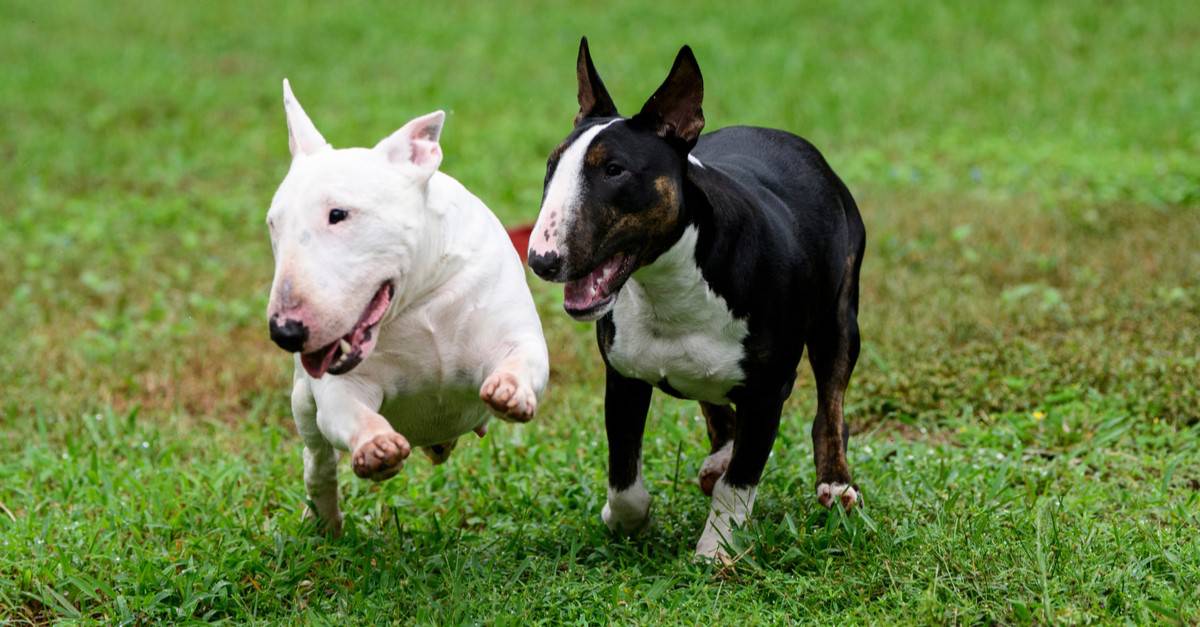We love our dogs, and that means bringing them into every possible aspect of our lives. This includes the way we speak! “A dog-eat-dog world” is one of the most common animal-related expressions in the English language. But what does it mean and where did it come from? And how do you use it correctly? Discover the meaning and origin of the idiom “a dog-eat-dog world”!
Meaning of the Expression “A Dog-Eat-Dog World”

The idiom “a dog-eat-dog world” refers to a situation in which people will use any means necessary to get ahead.
©otsphoto/Shutterstock.com
The expression “a dog-eat-dog world” refers to a situation in which people will use any means necessary to ensure their success without regard for the interests of others. It evokes a highly competitive environment, often with the implication that one should act in a similarly competitive way to avoid failure. Common applications include political, corporate, or sporting contexts.
A Doggy Dog World?
Because the phonetics are similar, some people mistake the phrase “a dog-eat-dog world” for “a doggy dog world.” This amusing eggcorn would seem to paint the picture of a happy world populated by playful pups. However, this is far from the meaning of the actual phrase, which refers to the ruthlessness needed to get ahead in a given situation. In 1993, Snoop Dogg may have helped popularize this erroneous variation with the release of the song “Doggy Dogg World.”
Other Forms of the Expression “A Dog-Eat-Dog World”
Besides the above phrase, this idiom also takes the following forms:
- Dog eat dog (noun): This shortened form of the original phrase can be used on its own as a noun to indicate a competitive ethos. For example: The dog eat dog of the corporate world.
- Dog-eat-dog (adjective): As an adjective, this shortened form of the original phrase can be used to modify various nouns other than “world.” For example: This is a dog-eat-dog environment.
Is “Dog-Eat-Dog” Hyphenated?
As a general rule in the English language, it is proper to hyphenate phrasal adjectives (adjectives that employ more than one word). In other words, if the phrase “dog-eat-dog” occurs before a noun, as in “a dog-eat-dog world,” you must hyphenate it. On the other hand, if you are using the phrase as a noun, it is not hyphenated.
The following are examples of this principle:
- As an adjective: This is a dog-eat-dog business. (Hyphenated.)
- As a noun: It’s dog eat dog out there. (Unhyphenated.)
Origins of the Expression “A Dog-Eat-Dog World”

The original “dog-eat-dog” reference actually meant that people would not harm or work against those similar to themselves.
©Katho Menden/Shutterstock.com
The origins of the phrase “a dog-eat-dog world” go back to ancient Rome. As early as 43 B.C., Roman scholar Marcus Terentius Varro recorded the Latin proverb “canis caninam non est” in his work De Lingua Latin (which translates to The Latin Language). In English, this proverb translates to “a dog does not eat the flesh of a dog.” Ironically, this expression meant that people do not harm other people similar to themselves, which is far from the meaning of the current phrase.
The original proverb would retain its meaning for some time after its initial appearance in English. In the 16th century, Erasmus’ essay “Bellum Erasmi” contained the phrase, “One dogge eatethe not an nother.” It also appeared in 1732 in historian Thomas Fuller’s work Gnomologia in the phrase, “Dogs are hard drove when they eat dogs.”
The current phrasal form would not appear until the 19th century. Possibly the earliest variation of “a dog-eat-dog world” occurred in “The Examiner” on December 5, 1813. Referring to trade and commerce, the quote reads, “‘Dog eat dog,’ is now our commercial motto and practice.” By the 20th century, this modern permutation had become the norm.
Examples of Everyday Usage of the Expression “A Dog-Eat-Dog World”

The phrase “dog-eat-dog” commonly applies to competitive contexts like politics, business, or sports.
©Skumer/Shutterstock.com
People use the idiom “a dog-eat-dog world” in a number of contexts in everyday life. It’s most often cautionary in nature, serving to warn people of the ruthless competition they will face. It can also be instructive, a piece of cynical advice for anyone looking to make their way in the world. Alternately, some people use the phrase to express a wryly humorous view of an unforgiving world or situation.
Examples of this phrase in everyday usage include:
- Be careful out there. It’s a dog-eat-dog world.
- The dog-eat-dog nature of the competition means competitors will have to be fierce.
- To get ahead in this dog-eat-dog climate, university graduates must be self-motivating and street-smart.
- The dog-eat-dog of the urban landscape contributes to a growing sense of alienation.
Real-Life Examples of the Expression “A Dog-Eat-Dog World”
Numerous musical artists over the past few decades have written songs using this phrase, including “Dog Eat Dog” by AC/DC and “Dog Eat Dog” by Adam and the Ants. Regarding the latter, band member Adam Ant claimed a Margaret Thatcher quote in a newspaper inspired him. Dog Eat Dog was also the name of an American game show that ran for two seasons from June 2002 to August 2003.
Words and Phrases Similar to “A Dog-Eat-Dog World”
Other words and phrases in the English language express much the same meaning as this famous expression. Here are a few examples of synonyms for the adjective “dog-eat-dog”:
- Aggressive
- Brutal
- Combative
- Competitive
- Cutthroat
- Ferocious
- Fierce
- Merciless
- Pitiless
- Ruthless
- Vicious
There are also a couple of idioms similar to “a dog-eat-dog world”:
- Every man for himself: One should put their own survival ahead of others’.
- Survival of the fittest: Only the strongest survive; to survive, one must be ruthless.
Other Idioms Involving Dogs

Other dog-related idioms include “let sleeping dogs lie,” “sleep like a dog,” and “dog-tired.”
©Benevolente82/Shutterstock.com
“A dog-eat-dog world” isn’t the only dog-related expression in the English language! Here are just a few examples of other ways in which we evoke our beloved canines in everyday speech:
- Every dog has his day: Success comes to everyone at some point.
- It’s raining cats and dogs: It’s raining heavily.
- Let sleeping dogs lie: Avoid talking about or interfering with a situation that could cause trouble.
- Dog-tired: Extremely tired.
- Work like a dog: Work extremely hard.
- Sleep like a dog: Sleep well or soundly.
- Run with the big dogs: Be able to keep up with the top competition through hard work or talent.
- As sick as a dog: Very sick.
- Like a dog with a bone: Persistent.
- Like a dog with two tails: Extremely happy.
- In the dog house: In trouble.
- Barking up the wrong tree: Doing or pursuing the wrong thing.
- Dog days: A period of hot weather that induces lethargy or laziness.
- Underdog: A person, team, group, etc. that is of low status or unlikely to succeed.
- Doggone: An adjective used to express strong emotion.
- Doggone it: A verb used to express emotions like irritation, anger, or surprise.
Conclusion
The next time you want to refer to a ruthlessly competitive situation, consider using the phrase “a dog-eat-dog world.” Even if its current meaning is a departure from the original, your listeners will be sure to get the picture!
Ready to discover the top 10 cutest dog breeds in the entire world?
How about the fastest dogs, the largest dogs and those that are -- quite frankly -- just the kindest dogs on the planet? Each day, AZ Animals sends out lists just like this to our thousands of email subscribers. And the best part? It's FREE. Join today by entering your email below.
Thank you for reading! Have some feedback for us? Contact the AZ Animals editorial team.








